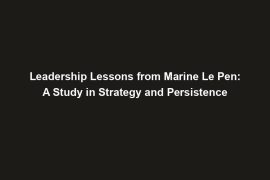Hey there, history buffs! Today, we’re diving into the fascinating world of leadership and taking a closer look at Louis XIII, the King of France from 1610 to 1643. Now, you might be thinking, What can a ruler from centuries ago teach me about leadership? Well, let me tell you, there is so much we can learn from studying historical figures like Louis XIII when it comes to leading others effectively in modern times.
Louis XIII may have ruled during a time vastly different from our own, but his leadership style and decisions have lasting relevance. By understanding how he governed and the lessons he learned along the way, we can gain valuable insights into what it means to be a strong and effective leader today. So, buckle up and get ready to uncover some key leadership lessons that Louis XIII has to offer!
Develop a strong vision and mission for your organization
One of the key leadership lessons we can learn from Louis XIII is the importance of developing a strong vision and mission for your organization. During his reign, Louis XIII was focused on strengthening the monarchy and centralizing power in order to maintain control over his kingdom. This clear vision guided his decisions and actions, providing a sense of direction for himself and his administration.
For modern leaders, having a clear vision and mission is essential for guiding their organizations towards success. It helps to align the efforts of employees towards a common goal and provides a framework for decision-making. Just like Louis XIII, it is important for leaders to prioritize clarity and consistency in their leadership goals to ensure that everyone knows what they are working towards.
Louis XIII’s focus on strengthening the monarchy and centralizing power
Louis XIII’s focus on consolidating power and strengthening the monarchy can be likened to a captain navigating a ship through treacherous waters. By centralizing power, Louis XIII was able to maintain order and control within his kingdom, much like how a captain steers a ship through rough seas to reach its destination. This focus on centralization helped him maintain stability and authority throughout his reign.
Importance of clarity and consistency in leadership goals
Just as a roadmap helps travelers reach their destination, having clear and consistent leadership goals can guide an organization towards success. By clearly defining objectives and staying consistent in their pursuit, leaders can ensure that everyone is working towards a common purpose. This not only fosters unity within the organization but also helps in achieving desired outcomes more efficiently.
Surround yourself with trustworthy advisors and allies
Another valuable lesson from Louis XIII’s leadership is the importance of surrounding yourself with trustworthy advisors and allies. Louis XIII relied heavily on Cardinal Richelieu as his chief minister, entrusting him with key decisions and responsibilities. This strategic partnership allowed Louis XIII to leverage Richelieu’s expertise and loyalty in governing the kingdom effectively.
Similarly, modern leaders can benefit from building a loyal and competent team to support their leadership initiatives. By surrounding themselves with trustworthy advisors and allies, leaders can gain different perspectives, expertise, and support in achieving their goals. Just as a general relies on their army to win a battle, leaders rely on their team to navigate challenges and drive success.
Applying Louis XIII’s Leadership Lessons Today
Now that we’ve taken a closer look at the leadership lessons we can learn from Louis XIII, let’s explore how we can apply these principles to modern leadership practices. As we navigate the complexities of the 21st century, it’s essential to draw from the experiences of historical leaders to inform our own approach to leadership. By reflecting on Louis XIII’s leadership style, we can gain valuable insights that can help us become more effective leaders in our own right.
Reflecting on Historical Leadership
When we think about applying Louis XIII’s leadership lessons today, it’s important to consider how his strong vision and mission for strengthening the monarchy can inspire us to develop clear goals for our own organizations. Just as Louis XIII focused on centralizing power to achieve his objectives, modern leaders can benefit from setting clear and consistent priorities to guide their actions.
Learning from Successful Leaders
Many successful leaders today have followed in Louis XIII’s footsteps by surrounding themselves with trustworthy advisors and allies. By building a loyal and competent team, leaders can ensure that they have the support and expertise needed to achieve their goals. Just as Louis XIII relied on Cardinal Richelieu as his chief minister, modern leaders can benefit from collaborating with talented individuals who share their vision.
Challenges and Considerations
Of course, implementing historical leadership lessons in a contemporary context comes with its own set of challenges. As we strive to apply Louis XIII’s principles to our own leadership roles, we must consider the unique circumstances and demands of our modern world. Flexibility and adaptability are key traits that can help us navigate the complexities of today’s fast-paced environment and respond effectively to unexpected challenges.
By reflecting on Louis XIII’s leadership style and considering how we can apply his lessons to our own roles, we can continue to grow and develop as effective leaders. As we look to the past for guidance, we can gain valuable insights that can help us navigate the uncertainties of the present and shape a more successful future.



